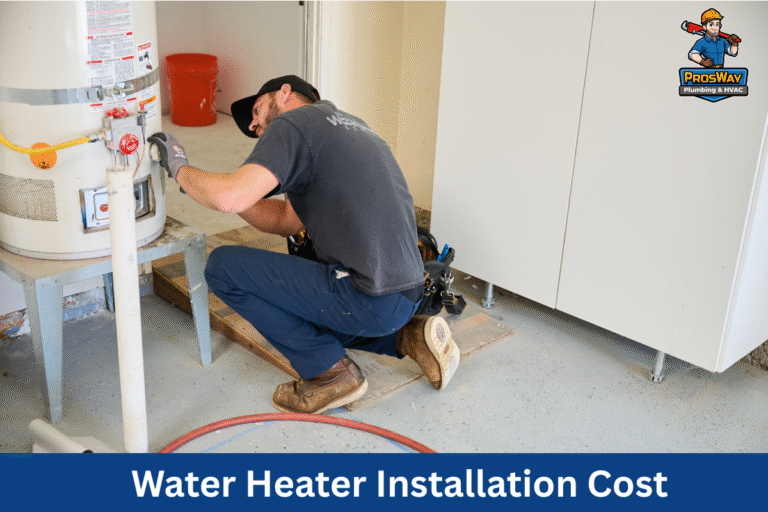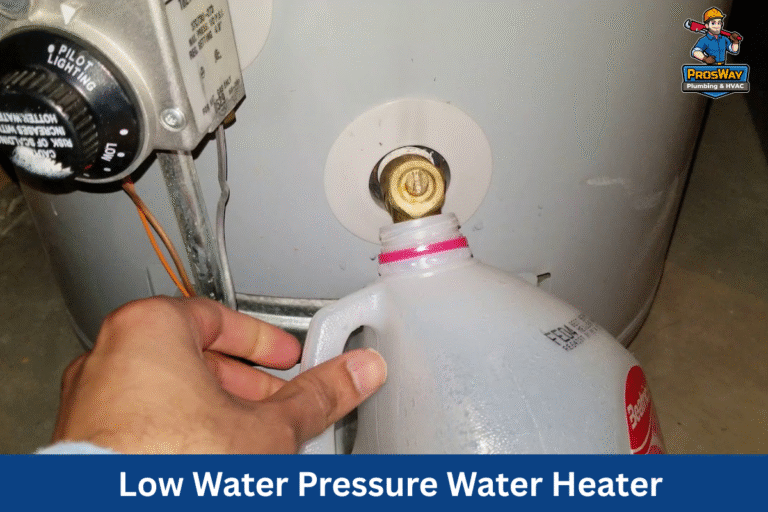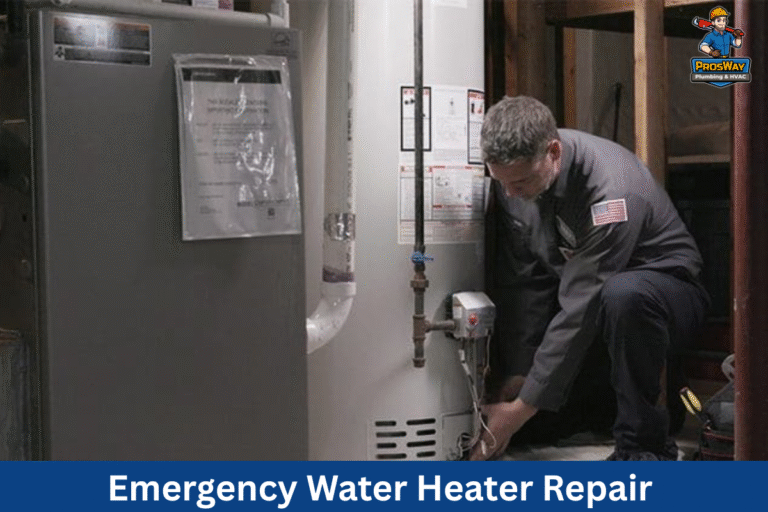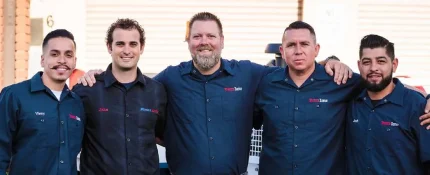A leaking water heater isn’t just an inconvenience; it’s a ticking time bomb for property damage, higher energy bills, and potential safety hazards. When you notice a leaking water heater, what you want is a fast, easy solution before the harm becomes irreparable. The great news is that authorized professionals can assist you with a defective water heater. This guide will cover the most common causes of water heater leaks, quick steps to control the situation, temporary fixes you can try, and proven ways to prevent future problems.
Common Causes of Water Heater Leaks
These are the most common causes of a water heater leaking water:
1. Age and Wear
Most tank water heaters last about 8–12 years. Over time, the internal shell corrodes, often due to sediment and mineral buildup. As corrosion progresses, tiny leaks can appear.
Replacement is usually more cost-effective than repair if your unit is nearing its typical lifespan and showing rust or water stains.
2. Loose or Damaged Connections
Leaks at the cold water inlet or hot water outlet are common. Heat cycles cause metal fittings to expand and contract, loosening inlet connections or outlet connections over time. These leaks often start small but can worsen quickly if not tightened or repaired.
3. Faulty Temperature and Pressure Relief (T&P) Valve
The T&P valve prevents dangerous pressure buildup inside the tank. If this valve fails, it can leak constantly through the discharge pipe. A bad T&P valve might be caused by internal corrosion, debris blocking the seal, or sustained high pressure. Ignoring this problem risks tank rupture.
4. Internal Tank Corrosion
When the anode rod wears out, the steel tank becomes the sacrificial metal, leading to rust. Sediment buildup accelerates the process by creating hot spots.
Signs of corrosion include brown water, visible rust at seams, or flakes in drained water. Once the tank body itself leaks, repair isn’t an option.
5. Leaking Drain Valve
The drain valve at the bottom of the tank allows for flushing out sediment. Over time, its seal can fail or the valve can crack. A slow drip here is common after maintenance, but a steady leak means the valve may need replacement.
6. Excessive Water Pressure
Municipal systems in parts of Northern NJ sometimes deliver water at higher pressures. If this exceeds 80 PSI, your storage tank is under constant stress. High pressure triggers the T&P valve and causes pinhole leaks in fittings and tank seams.
7. Sediment Build-Up
Hard water in New Jersey accelerates sediment accumulation. This layer insulates water from the burner or heating element, overheating the metal above and causing cracks or leaks. Annual flushing with a garden hose helps control buildup, but if neglected for years, damage is often irreversible.
Immediate Steps When You Notice a Leak
Safety First
- Electric water heater: Turn off the power at the circuit breaker.
- Gas water heater: Turn the gas shut-off valve to the “off” position.
- Shut off the main water supply or the cold water supply line feeding the heater.
Identify the Leak Location
- Water heater leaking from top: Often caused by loose inlet/outlet fittings or faulty T&P valves.
- Water heater leaking from bottom: Usually due to tank corrosion, drain valve failure, or sediment damage.
- Side leaks: Can come from fittings, expansion tanks, or side-mounted valves.
Is it Condensation or a Water Heater Leak?
When you observe moisture surrounding your water heater, do not panic. Firstly, exclude condensation as a possible cause before considering it a leak. Condensation happens when cold water enters a hot tank or during high humidity.
This moisture will evaporate in a few hours. True leaks leave a consistent puddle under the heater. Wipe the tank dry and check later; if water reappears, it’s a leak.
Contain the Water
Use buckets, towels, or a drain pan to catch water. Keep it away from walls and electrical outlets. Protecting the flooring is critical to avoid long-term damage if your heater sits in a mechanical closet.
Temporary Fixes to Stop or Slow a Leak

Tightening Loose Fittings
Leaks around the cold water inlet or hot water outlet are often due to fittings working loose over time. Heat cycles cause expansion and contraction, which can loosen threads and connections.
Steps:
- Shut off power (at the circuit breaker for electric units, or use the gas shutoff valve for gas models).
- Close the main shutoff valve or the cold water supply valve to the heater.
- Use a pipe wrench or adjustable pliers to gently tighten the connection.
- Avoid over-torquing; too much force can damage threads or crack fittings.
Replacing a Washer or Seal
Old washers or seals can harden, crack, or wear down, leading to persistent drips even after tightening.
Process:
- Turn off the power and water supply.
- Disassemble the affected joint or valve using the proper tool.
- Match the washer or seal to the manufacturer’s specification for your tank water heater or tankless water heater.
- Install the new washer, reassemble, and test for leaks using a leak detection solution.
Adjusting Water Pressure
Excessive municipal water pressure, common in parts of Northern New Jersey, can push past seals and valves, causing leaks or activating the temperature and pressure relief valve (T&P valve) unnecessarily.
Check & Adjust:
- Attach a pressure gauge to an outdoor spigot.
- If readings exceed 80 PSI, install or adjust a pressure-reducing valve (PRV).
- Keep PSI between 50–60 for optimal safety and longevity of your storage tank and plumbing.
Draining Sediment from the Tank
Sediment and mineral deposits accumulate faster in hard water areas, creating hot spots that weaken the internal shell of the tank.
Flushing Steps:
- Shut off the heater’s power and let the water cool.
- Attach a garden hose to the drain valve at the bottom of the tank.
- Direct the hose to a floor drain or outside.
- Open the valve and flush until the water runs clear.
- Close the valve, refill the tank, and restore power.
- Flushing also extends the life of the anode rod and improves efficiency.
Using Epoxy Putty for Minor Cracks
When to Use: Only for small, external cracks in fittings or pipes, never for structural tank leaks.
How:
- Shut down the heater and dry the surface completely.
- Mix and apply epoxy putty over the crack, pressing it firmly into place.
- Allow full curing before turning the water supply back on.
This is purely a stopgap measure until a professional plumber can perform a permanent repair.
When to Call a Professional Immediately
Signs of a Major Problem
Certain leak situations can’t be solved with DIY steps:
- Rapidly spreading puddles or heavy dripping.
- Visible cracks in the external shell or storage tank.
- Water is pooling near electrical connections or the electrical panel.
- A strong smell of natural gas or evidence of combustion backdraft.
In these cases, shut off water and power immediately, then seek professional help.
Benefits of Calling Prosway Plumbing & HVAC
For homeowners in Northern New Jersey, Prosway Plumbing & HVAC is more than just a repair service; it’s a local partner that understands the urgency and complexity of water heater issues.
Our rapid response time is critical during the region’s freezing winters, when even a small leak can escalate into costly water and property damage in hours. Our team is made up of fully licensed plumbers skilled in diagnosing and servicing all types of systems, from traditional gas water heaters and electric water heaters to modern tankless water heaters.
Long-Term Prevention of Water Heater Leaks

Annual Maintenance
Routine maintenance is the simplest way to extend the life of your water heater and prevent leaks. Schedule a yearly inspection to check all water supply lines, valves, and fittings for corrosion or looseness.
Flush the tank once a year to remove sediment and mineral deposits that can lead to overheating and tank damage.
Installing an Expansion Tank
If your home’s plumbing is closed-loop or you live in an area with frequent municipal pressure changes, an expansion tank helps absorb excess pressure from thermal expansion. This reduces stress on the tank shell and joints, lowering the risk of leaks.
Checking and Replacing the Anode Rod
The anode rod is a sacrificial metal rod that prevents internal tank corrosion. Inspect it every 2–3 years and replace it if more than 50% is worn away. This is critical for gas water heaters, electric water heaters, and even hybrid models to maintain the integrity of the internal shell.
Monitoring Water Pressure
Use a pressure gauge to check water pressure regularly. Keep it between 50–60 PSI. High pressure (above 80 PSI) increases the risk of leaks and damages the temperature and pressure relief valve (T&P valve). A pressure-reducing valve can help maintain safe levels.
Softening Hard Water
In regions with hard water, such as parts of Northern New Jersey, installing a water softener reduces mineral buildup inside the tank. This prevents sediment-related overheating and extends the heater’s lifespan.
Upgrading to a New Water Heater
If your water heater is over 10 years old and showing signs of corrosion or leaks, replacing it may be more cost-effective than repairing it. Modern tankless water heaters and high-efficiency tank models can lower utility bills and provide longer service life.
Act Fast – Protect Your Home
Prosway Plumbing & HVAC can inspect, repair, or replace your water heater quickly and professionally. Call Prosway Plumbing & HVAC today for expert leak diagnosis, same-day service, and peace of mind.
Frequently Asked Questions
What do I do if my water heater is leaking?
Turn off power (gas shutoff valve or circuit breaker). Shut off the cold water supply to stop the leak. Identify the leak source and call a licensed plumber for repairs or replacement.
Is a leaking water heater an emergency?
Yes. Even small leaks can cause water damage, mold growth, or safety hazards. Gas leaks or electrical issues make it an urgent situation.
Can I still use my water heater if it’s leaking?
No. Using it can worsen the leak, cause flooding, or increase safety risks. Shut it down until it’s inspected.
Is it cheaper to repair or replace a leaking water heater?
Small leaks from fittings or valves may be repairable. If the tank itself is cracked or corroded, replacement is usually the only option and is more cost-effective long term.
What’s the most common cause of water heater leaks?
Internal tank corrosion from sediment buildup and a worn-out anode rod is the most common cause. Regular maintenance can prevent it.








